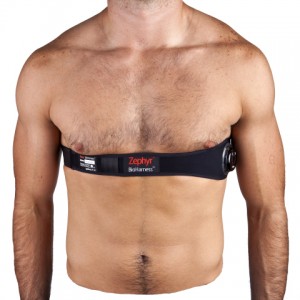 After BenJarvus Green-Ellis, then of the New England Patriots, wore a specialized chin strap from Battle Sports Science to measure how hard he was hit during Super Bowl XLVI in February 2012, MobiHealthNews described the presence of mobile health as "stealthy." During a grueling cycling tour in Europe planned for September, the technology will be front and center.
After BenJarvus Green-Ellis, then of the New England Patriots, wore a specialized chin strap from Battle Sports Science to measure how hard he was hit during Super Bowl XLVI in February 2012, MobiHealthNews described the presence of mobile health as "stealthy." During a grueling cycling tour in Europe planned for September, the technology will be front and center.
As many as 100 riders will be pedaling for nearly two weeks from Brussels, Belgium, to Barcelona, Spain, in the first-ever mHealth Grand Tour, meant to highlight how mobile technologies can help fight diabetes. About three dozen riders, some with type 1 diabetes, will wear Dexcom G5 continuous glucose monitors – a premarket product launched at 2013 International CES – as well as Zephyr BioHarness sensors to capture their heart rate and other vital signs.
Riders also will track cycling stats with ANT+ wireless bike computers that, like the health monitors, will transmit data to their smartphones as well as to a mobile-to-mobile module that will transmit data to researchers. All the data transfers will follow Continua Health Alliance standards, according to Jeanine Vos, executive director of mHealth at the London-based GSM Association, which is facilitating the mHealth Grand Tour.
"We hope it is an exciting event that will raise awareness among the general public about diabetes care and the role mobile health can play," Vos told MobiHealthNews.
Newcastle University Institute of Cellular Medicine's MoveLab, a physical activity and exercise research center at the British school, will be collecting data during the tour for a clinical trial. Michael Trennell, a clinical physiologist who directs MoveLab, "will be focusing on the impact of significant exercise on glycemic levels in type 1 diabetes mellitus and comparing to athletes without diabetes," Vos said.
And the exercise is indeed significant. The tour, which runs Sept. 5-18, will cover 2,100 km, or about 1,300 miles, in 13 days of riding over 14 days, and participants will be climbing a total of 22,000 meters (more than 72,000 feet). In comparison, the 2013 Tour de France covered 2,115 miles in 21 stages over 23 days.
Unlike the Tour de France, however, riders in the mHealth Grand Tour do not have to be professionals or even elite athletes, and people are welcome to join for a single stage of 3-4 days each, though Vos said no more than 100 riders will be on the road on any given day. And unlike the Tour de France, this new event is a ride, not a race, meant not only to highlight the power of mobile health, but also to raise awareness of diabetes, a disease that afflicts 371 million people worldwide, including 55 million in Europe.
GSMA last year launched a campaign called mDiabetes to explore how mobile technologies can improve treatment of diabetes.
The International Diabetes Foundation's European Region, which is co-presenting the mHealth Grand Tour with GSMA, estimates that nearly 39 percent of Europeans cases of diabetes are undiagnosed. "For diabetes, prevention is really important to help people make better choices," Vos said, adding that regular exercise helps prevent type 2 diabetes.


















